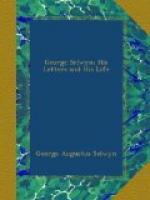(177) The Treasury was on the site of the Whitehall Cockpit, which had been placed there by Henry VIII. It was converted into offices for the Privy Council in 1697. The Ministerial meetings being held there, the word, in political slang, was used for a meeting either of Ministerialists or the Opposition.
(178) The news of the surrender of Cornwallis at Yorktown on October 17, 1781, was received in London on November 25th.
(179) See letter from Storer, November 26th, below.
Storer as usual supplemented his friend’s letter by the following note:
Anthony Storer to Lord Carlisle.
1781, Nov. 26, Monday.—I arrived in town this morning, time enough to do all in my power to send to Gregg, to try if I can get a qualification to take my seat to-morrow. My qualifications have been always embarrassing to me. I have too attended the Cockpit to-night, where there were a great many long faces. What we are to do after Lord Cornwallis’ catastrophe, God knows, or how anybody can think there is the least glimmering of hope for this nation surpasses my comprehension. What a stroke it is! but it still seems determined to pursue the game, though we throw nothing but crabs. . . .
Selwyn meant to treat you to-morrow with a Georgic, Everybody that I meet seem(s) to think that you did right in dispatching Mr. Flood. I am so loaded with questions about Ireland, that I have no time as yet to make any myself about England. Indeed, the attention of everyone is confined to our situation in America. The Speech from the Throne contains the same resolution which appeared in times when we seemed to have a more favourable prospect of success, of continuing the war, and of claiming the aid of Parliament to support the rights of Great Britain. Charles has a Cockpit to-night, as well as Lord North. The blue and buff Junto meet in St. James’ Street to fix upon their plan of operations for to-morrow.
With regard to private news, I find Lady Worsley is run away from Sir Richard, and taken refuge with some gentleman whose name I do not know in the army. I must go and pay my respects to my father.
Parliament opened under the shadow of the disasters in America on November 27th. The Speech from the Throne showed no appreciation of the gravity of the national situation, and the policy of the Government was at once challenged by Fox, who moved, an amendment to the Address. It was negatived, however, by 218 to 129 votes. The House of Commons though it supported the Minister was conscious of the folly of his policy, and on the following day the Opposition again challenged the Government on the Report of the Address. The result was again a defeat—more nominal than real—of the Opposition by 131 votes to 54. Two days later (November 30th) on the motion that the House should go into Committee of Supply, Mr. Thomas Pitt (afterwards Lord Camelford) the uncle of William Pitt, who from character and




